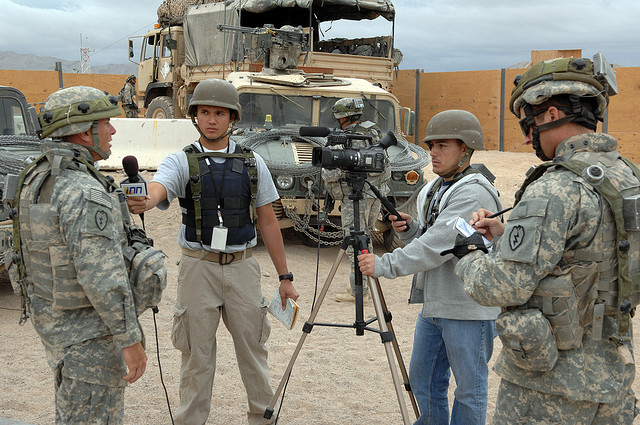
Reporters from International News Network interview a US soldier from 2nd Battalion. Image: US Army on Flickr
War reporting is the litmus test of good journalism. On the Afghan war, the jury is still out. Is there too much embedding, too much 'Boys Own' reportage and not enough analysis of the rounded picture?
Mine and Richard Keeble's new edited collection, Afghanistan, War and the Media: Deadlines and Frontlines, puts that coverage firmly under the microscope. Extracts will be published by Journalism.co.uk over the course of this week.
The book explores journalism coming out of the Afghan war from the perspectives of the frontline and the study. It is an unusual hybrid: the testimony of some of the best frontline correspondents of our era alongside detailed academic analysis. It ranges from the poppy fields of Helmand province to New York via the Iraq War and the modern rebirth of "embedding". It mixes action, reflection, and analysis and draws attention to under-reported issues such as the role of women and the humanitarian effort in Afghanistan.
The book has its origin in a March 2010 conference, part of the Coventry Conversations series put on by the University of Coventry in conjunction with the BBC College of Journalism and Journalism.co.uk (with financial support from the ProVice-Chancellor and the Dean of Business). The conference can be seen and heard on the BBC College of Journalism or www.coventry.ac.uk/itunesu. Many of the contributors to this book took part in that conference.
The idea for the conference and for the book took hold when I judged the Royal Television Society News Programme of the Year Awards for 2009. All network entries featured frontline action from their stars. Many of whom have contributed to this book.
Allan Little, the BBC's special correspondent, reported on the Gulf Conflict of 1991 and it gave him an enduring distrust of embedded reporting. Now, he argues, independent, free-roaming, eye-witness reporting, which journalists once pursued with such vigour and commitment, faces enormous threats.
Alex Thomson, chief correspondent of Channel Four News and a multiple embed in Afghanistan, says that in future he aims to tweet live from the battlefield. It is very hard to see how the MoD's media minders can filter this process, he says.
Sky News' Stuart Ramsay, aged just 45, is already a veteran reporter of 16 wars including Chechnya, Sierra Leone, Israel, Gaza, Lebanon, Sudan, Bosnia, Kosovo, Somalia and Afghanistan. He argues in his piece that the embeds are here to stay. But they owe it to themselves and their viewers, readers and listeners never to let their guard down and always ask this basic journalistic question: am I being lied to?
Sky News' Alex Crawford, a Royal Television Society winner at those awards I judged, tells how she manages to combine embedded reporting from both sides of the Afghan conflict. And while a general picture of the conflict may be possible based on time spent with either of the fighting forces, she says much of the truth about how the war is going will be filled in by the civilians at the centre of it all.
Vaughan Smith is the founder of the Frontline Club in London who filmed the only uncontrolled footage of the Gulf War in 1991 after bluffing his way into an active-duty unit disguised as a British army officer. In the book, he argues that news management by the military is a risky business. Though it might maintain a certain level of support for the war that backing becomes more brittle for the deception.
This front line reportage and reflection is mixed with analysis from the leading journalism academics, including Kevin Marsh, Tim Luckhurst, Philip Knightley, Richard Keeble, and John Tulloch.
Extracts from the book will be published by Journalism.co.uk over the course of this week and there will be a launch event at the Frontline Club on 15 September: Who is Winning the Media War in Afghanistan?
Afghanistan, War and the Media: Deadlines and Frontlines (ISBN 9781845494445) is published by Abramis on 13 September.
Free daily newsletter
If you like our news and feature articles, you can sign up to receive our free daily (Mon-Fri) email newsletter (mobile friendly).
Related articles
- Delivering news during the war: reflections on EBU's visit to Ukraine
- Ukrainian journalists are at a breaking point. It is time to make a change
- Six career lessons in war and conflict reporting
- Unveiling the lessons of a war reporter's journey, with Andrea Backhaus
- Why journalists risk their lives for a story, with Dr Anthony Feinstein









